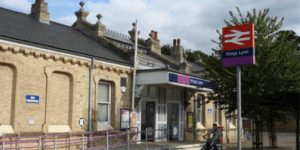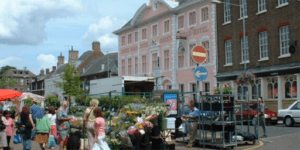HOPE not hate uses cookies to collect information and give you a more personalised experience on our site. You can find more information in our privacy policy. To agree to this, please click accept.

Last year, teaching in a rural Fenlands schools was a turning point for me. The school had given me a class of 60 in a room designed for 30 and it was a struggle to keep on top of things. We sometimes (actually quite often) get classes that do not want listen to us. Our message of respect and openness might go against a narrative the students have been fed all their lives at home and this is hard to break – even harder to realise that your parents might have got things wrong. HOPE not hate Education Unit staff can sometimes have a tough gig.
This was a partially hard class, but nothing I had not confronted before. This particular group seemed bothered by the idea of women’s rights, particularly the girls, and struggled to acknowledge that sexism does exist in this country. Quite a challenge, but then that is why we do this. Then something happened that shocked me.
“Have you been to King’s Lynn?” a girl asked. “Afraid not”, I replied; which silenced the room. Rather surprised at my answer she asked again “so, you have never been to King’s Lynn?” “Nope, sorry. Had no reason to.” There was a very slight pause before this girl aggressively and cruelly pointed and laughed at me. Others joined in at this guest speaker who had never been to King’s Lynn. I stood there confused.
There are two ways that we end up delivering our workshops in schools. The first is that a school gets in touch and we discuss what they need and if we have anything suitable. The second is that we ourselves reach out to schools to offer our free services.
Most charities in our sector use things like deprivation indexes to choose where in the country to target, but at HOPE not hate Charitable Trust we are lucky to have an outstanding research team. They provide us with data that allows us to track areas of the country that are most vulnerable to racist ideologies.
Many of the areas this data flags up are very rural market towns, where any industry of note disappeared long ago and the town’s identity and aspirations went with it. The town this school was in is the very model of these areas. The buildings tell a story of a once prosperous town, now unloved, with one road in and out and the railway station demolished.

Many of the young people in this class had never been further from home than their nearest market town, Kings Lynn. Their only reference points were those within this small, cutaway, corner of England. The things I was trying to talk about were a world away, and this is why it was a difficult class. They had no knowledge of life even a few streets away, and this made empathy very hard. They were also blind to the challenges their community faces as they lacked any wider experiences that would highlight them.
To give a very trivial analogy, it reminded me of when I used to play village cricket; I thought I was the bee’s knees! Batters could not play me, I took wickets galore and saw myself as a role model when fielding. I moved on to playing for a bigger team and within two minutes I was made all too aware of some serious flaws in my technique – I was utterly ripped apart!
I have since been to King’s Lynn. I am afraid to say that it is nothing to write home about. But as I stood in the market place I was determined that we need to get these students to see other parts of the country. If we can open their horizons, we can open their minds. And I am very pleased to say that we have achieved this.

Thanks to some generous funding from Facebook, we have held two regional training days in Leicester and Cambridge where we have invited schools from some of our target areas to bring along Year 9 pupil premium (those from disadvantaged background) students.
The students went through our Ambassador Programme, exploring how inequality, power and prejudicial language all feed into discrimination. But with a little twist.
The Leicester event was held at the University of Leicester and the Cambridge event at Murray Edwards College, University of Cambridge, to open the students’ eyes to wider horizons. At each event they were given time to explore the city and hopefully realise that these institutions and cities are as much for them as anyone else.
Being proud of your hometown is wonderful, but there needs to be an acknowledgement of the world outside it.

The next stage of this project is to take them to London in 2020 for a trip around the Houses of Parliament and then finally to Facebook’s UK Head Office where they will be engaged in a number of fun activities to help raise their aspirations.
Too many of these rural towns are written off as hotbeds of racism and other intolerances, but we at HNHCT see them through a different lens.
Many young people in these towns just lack the experiences and opportunities people in richer or more urban parts of the country take for granted. As a result, the comments they come out with can be seen as intolerant; when often it is just ignorance or sometimes fear of the unknown. A fear of the scary world that lies beyond their town’s borders.
We hope projects like this can help to address these fears and, in turn, help towards creating a fairer and more open minded society in all pockets of the United Kingdom.

HOPE not hate reveals two more extremist candidates from Reform UK, in the latest of a string of embarrassments for the party UPDATE: Just hours…